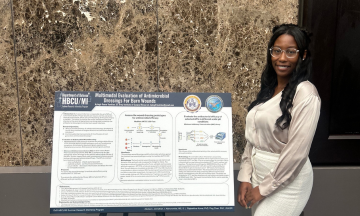Kyleigh Reese Hankton, a nursing student at Alcorn State University, has recently completed an internship with the Department of Defense’s Historically Black Colleges and Universities/Minority Institutions (HBCU/MI) internship in Washington, D.C. During her internship, she presented research on the “Multimodal Evaluation of Antimicrobial Dressings for Burn Wounds.”
“This opportunity has allowed me to gain specialized and advanced on-the-job experience and cutting-edge research approaches that can not only extend wound care in protecting our military service officers but in healthcare as a whole,” said Hankton.
Hankton, who call both New Orleans and Zachary, La. home, conducted her research under the mentorship of scientists at the United States Army Institute of Surgical Research, JBSA Fort Sam Houston, Tex.
“My research was conducted under the mentorship of S. L. Rajasekhar Karna, Ph.D., Ping Chen, Ph.D., Eliza A. Sebastian, M.S., Johnathan J. Abercrombie, M.S. As a biologist and nursing student, I wanted to find a study that allowed me to enhance my skills in microbiology, but also focused on client-centered care, said Hankton.”
Her study focused on assessing wound dressings and active pharmaceutical ingredients (APIs) for antimicrobial efficacy against common burn wound pathogens.
“The focus of my research assessed the wound dressings/APIs for antimicrobial efficacy against some of the commonly found burn wound pathogens, such as Pseudomonas aeruginosa, Acinetobacter baumannii(gram-negative) and Staphylococcus aureus, Enterococcus faecium (gram-positive),” Hankton said. In addition, I examined the antimicrobial dressings developed at the US Army Institute of
Surgical Research to control burn wound infections. Also, Are there potential improvements of the efficacies of next generation antimicrobial dressings?.”
Key findings from Hankton’s research revealed that proprietary wound dressings exhibited significant antimicrobial activity compared to control dressings. Additionally, her work demonstrated that certain APIs, such as silver sulfadiazine, showed enhanced antibacterial activity under specific pH conditions.
During her research, Hankton faced some challenges that she was able to quickly resolve due to her nursing studies.
“The most significant challenge I encountered during my research was making sure that I managed my time efficiently,” she said. “In research, experiments can last days and overlap, especially when you’re conducting multiple experiments. In addition, I had to maintain and schedule frequent meetings with my research mentors to discuss the experiments and my findings. I also had to ensure that my data was accurate by maintaining detailed notes in my lab notebook because accuracy is an integral component of research. I was able to overcome those challenges due to my training in nursing school. Nursing school and clinicals are demanding. I had to learn quickly how to prioritize my academics and community service commitments to maximize my time. Also, in nursing school, we learn how to chart and maintain very descriptive notes because those notes are essential to assisting doctors in providing the appropriate care for patients.”
Her research has potential implications for improving infection control practices and decreasing hospital-acquired bacterial infections, particularly among Black and Brown patients who face disproportionately higher rates of such infections.
“The Centers for Disease Control analysis found that Black and Brown patients are 40 percent more likely and have disproportionately higher rates of contracting staph and other bacterial infections due to their high propensity of diabetes and other underlying conditions such as high blood pressure and obesity,” Hankton said. “Ultimately, I hope my research influences hospitals and healthcare practitioners to use the antimicrobial dressing, which will improve infection control practices and decrease hospital acquired bacterial infections.”




